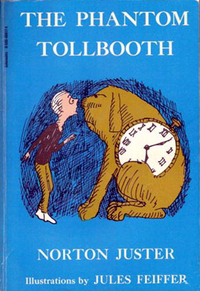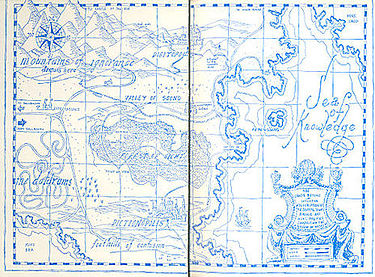- The Phantom Tollbooth
-
This article is about the novel. For the 1970 film adaptation, see The Phantom Tollbooth (film). For the band, see Phantom Tollbooth (band).
The Phantom Tollbooth
Milo and Tock on the front coverAuthor(s) Norton Juster Illustrator Jules Feiffer Country United States Language English Genre(s) Fantasy Publisher Random House Publication date 1961 Media type Print (Paperback) Pages 256 ISBN 0-394-81500-9 OCLC Number 299866174 The Phantom Tollbooth is a children's adventure novel and modern fairy tale published in 1961, written by Norton Juster and illustrated by Jules Feiffer. It tells the story of a bored young boy named Milo who unexpectedly receives a magic tollbooth one afternoon and, having nothing better to do, decides to drive through it in his toy car. The tollbooth transports him to a land called the Kingdom of Wisdom. There he acquires two faithful companions, has many adventures, and goes on a quest to rescue the princesses of the kingdom, Princess Rhyme and Princess Reason. The text is full of puns, and many events, such as Milo's jump to the Island of Conclusions, exemplify literal meanings of English language idioms.
Juster claims his father's fondness for puns and The Marx Brothers' movies were a major influence.[1] The Phantom Tollbooth achieved "instant classic" status upon publication. Critics have compared its appeal to that of Lewis Carroll's Alice's Adventures in Wonderland.
The book has been translated into several languages.[2]
Contents
Plot
Milo is a boy bored by the world around him; every activity seems a waste of time. He arrives home from school one day to find in his bedroom a mysterious package that contains a miniature tollbooth and a map of "the Lands Beyond". Attached is a note, "FOR MILO, WHO HAS PLENTY OF TIME". He assembles the tollbooth, takes the map, drives through the tollbooth in his toy car, and instantly finds himself on a road to Expectations. Enjoying the ride, and stopping shortly to speak with the Whether Man, he pays no attention to his route and soon becomes lost in the Doldrums, a colorless place where thinking and laughing are not allowed. However, he is found there and rescued by Tock, a "watchdog" with an alarm clock attached to him, who joins him on his journey.
Their first stop is Dictionopolis, one of two capital cities of the Kingdom of Wisdom. They visit the word marketplace, where all the world's words and letters are bought and sold. After an altercation between the Spelling Bee and the blustering Humbug, Milo and Tock are arrested by the very short Officer Shrift. In prison, Milo learns the history of Wisdom. Its two rulers, King Azaz the Unabridged and the Mathemagician, had two adopted younger sisters, Rhyme and Reason, who had settled all disputes in the kingdom. Everyone lived in harmony until the rulers disagreed with the princesses' decision that letters and numbers were equally important. They banished the princesses to the Castle in the Air, and since then, the kingdom has been plagued with discord and disharmony.
Because Officer Shrift cares only to put people in prison, not to keep them there, Milo and Tock leave the dungeon and attend a banquet given by King Azaz, where the guests literally eat their words. King Azaz allows Milo and the Humbug to talk themselves into a quest to rescue the princesses. Azaz appoints the Humbug as a guide, and he, Milo and Tock set off for the Mathemagician's capital of Digitopolis to obtain his approval for their quest.
Along the way they meet such characters as Alec Bings, a little boy who sees through things and grows until he reaches the ground, and have adventures like watching Chroma the Great conduct his orchestra in playing the colors of the sunset.
In Digitopolis, their first stop is the mine where numbers are dug out and precious stones are thrown away. They eat subtraction stew, which makes the diner hungrier. The Mathemagician erases the mine with his magic pencil eraser, he and Milo discuss Infinity, and Milo proves to the Mathemagician that he must allow them to rescue the princesses.
In the Mountains of Ignorance, the three intrepid journeyers contend with lurking, obstructionist demons like the Terrible Trivium and the Senses Taker. Milo thwarts them from stopping his quest by using gifts he received in Wisdom. After overcoming various obstacles and their own fears, the questers reach the Castle in the Air. The two princesses welcome Milo and agree to return to Wisdom. When the group leaves, Tock carries them through the sky because, after all, time flies. The demons chase them, but the armies of Wisdom, (made up of troopers, horseback cavalry,swordsmen, archers, snipers, marines, soldiers with 1960 guns and many more) repulse them. The armies of Wisdom welcome the princesses home, King Azaz and the Mathemagician are reconciled, and all enjoy a three-day carnival celebration of the return of Rhyme and Reason.
Milo says goodbye and drives off, feeling he has been away several weeks. Ahead in the road he spots the tollbooth and drives through. Suddenly he is back in his own room, and discovers he has been gone only an hour.
He awakens the next day full of plans to return to Wisdom, but when he returns from school the tollbooth has vanished. A new note has arrived, addressed, "FOR MILO, WHO NOW KNOWS THE WAY." Milo is disappointed and hopes the tollbooth will return to him some day. However, he looks around him and finds that the world is now beautiful and interesting.
Characters
Main characters
- Milo, a school-aged boy, the main character, bored with life prior to receiving the tollbooth.
- Tock, a "watchdog" who becomes a loyal companion to Milo. He has an alarm clock attached to his body.
- The Humbug, a large, bombastic, beetle-like insect who craves attention and is always wrong. Milo's other companion.
- King Azaz the Unabridged, ruler of Dictionopolis and lover of words. He is The Mathemagician's brother.
- The Mathemagician, ruler of Digitopolis and lover of numbers. He is King Azaz's brother.
- Princesses Rhyme and Reason. Adopted daughters of the Old King of Wisdom.
Minor characters
- Faintly Macabre (or Aunt Faintly), the Not-So-Wicked Which. When she regulated all words used in public, she became so stingy with them that people became afraid to talk at all.
- Chroma, conductor of an orchestra that plays all the world's colors.
- Dr. Kakofonous A. Dischord, a scientist who enjoys creating unpleasant sounds, and curing pleasant sounds
- The Awful DYNNE ("awful din"), a djinn who collects noises for Dr. Dischord.
- The Soundkeeper, who loves silence, rules the Valley of Sound. Her vaults keep all the sounds ever made in history.
- The Dodecahedron, an inhabitant of Digitopolis with twelve faces, each of which shows a different emotion.
- Officer Shrift, a very short man, the police force of Dictionopolis.
- The Lethargarians, lethargic, (hence name) small creatures who live in the Doldrums, and are lazy.
- The Spelling Bee, an expert speller, enemy of the Humbug.
- The Half Boy, a boy who is only .58 of a person from an "average" family, which had 2.58 children.
- Canby, a frequent visitor to the Island of Conclusions, who is as much "as can be" of any possible quality.
- King Azaz's advisors: the Duke of Definition, Minister of Meaning, Count of Connotation, Earl of Essence, and the Undersecretary of Understanding.
- The Whether Man, who deals with "whether" things are, rather than the weather.
- Alec Bings, a boy of Milo's age and weight who sees through things. He grows downwards from a fixed point in the air until he reaches the ground, unlike Milo, who grows upwards from the ground.
- The Everpresent Wordsnatcher, a dirty bird that "takes the words right out of your mouth". He is not a demon, just a nuisance.
- The Terrible Trivium, a demon in the Mountains of Ignorance who wastes time with useless jobs.
- The Demon of Insincerity, a misleading demon who never says what he means.
- The Gelatinous Giant, a demon who blends in with his surroundings and is afraid of everything.
- The Senses Taker ("census taker"), a demon who robs Milo, the Humbug, and Tock of their senses by wasting their time and asking useless questions.
Critical reaction
Critics have acknowledged that the book is advanced for most children, who would not understand all the wordplay or the framing metaphor of the achievement of wisdom.[3][4] Writers like the reviewer in The New York Times have focused on the children and adults able to appreciate it; for them, it has "something wonderful for anybody old enough to relish the allegorical wisdom of Alice in Wonderland and the pointed whimsy of The Wizard of Oz".[5] It is now acknowledged as a classic of children’s literature.[6]
Adaptations
- Animation director Chuck Jones adapted the book into The Phantom Tollbooth, a feature live-action/animated film of the same name, in 1971.
- In 1995, Juster adapted Tollbooth into a libretto for an opera.
- Various stage adaptations have been created and performed. In 1977, a two-act play by Susan Nanus was published. The musical adaptation, with a score by Arnold Black, premiered in 1995. In 2004, The Phantom Tollbooth was adapted as an official theatrical screenplay by Patrick Sayre and Cole Taylor.
- In 1987, composer Robert Xavier Rodriguez adapted a chapter of The Phantom Tollbooth into "A Colorful Symphony" for narrator and orchestra.
- In 2008, the John F. Kennedy Center for the Performing Arts launched a 6-month tour of a children's theater adaption of The Phantom Tollbooth.
- In February 2010, director Gary Ross began development of a remake of The Phantom Tollbooth under Warner Bros. with the first draft of the script written by Alex Tse.[7]
In popular culture
- A Harry Turtledove short story about an alternate history WWII where Fyodor Tolbukhin leads Russian partisans against the occupying German forces is named "The Phantom Tolbukhin" in a play on Juster's book.
- Comedian Adam Carolla frequently mentions The Phantom Tollbooth as the only book he's ever read.
- In the first episode of the third season of the Sam & Max games, Sam mentions that they had "wasted too much time poking around that tollbooth."
- In episode two of the first season of Parks And Recreation, Amy Poehler's character Leslie Knope starts reading The Phantom Tollbooth to filibuster her own meeting.
References
- ^ Dobbs Ferry Middle School Production of The Phantom Tollbooth press release from Dobbs Ferry Union Free School District website
- ^ An Interview with Norton Juster, Author of The Phantom Tollbooth by RoseEtta Stone from The Purple Crayon
- ^ Saturday Review 45, no. 3 (20 January 1962): 27.
- ^ Mathews, Miriam. Library Journal (15 January 1962): 84.
- ^ McGovern, Ann. “Journey to Wisdom.” The New York Times, November 12, 1961, p. BRA35
- ^ Jays, David. "Classic of the Month: The Phantom Tollbooth." Guardian (London, England) (31 March 2004): 17.
- ^ Billington, Alex (February 17, 2010). "Gary Ross Bringing Phantom Tollbooth Back to the Big Screen". FirstShowing.net (First Showing, LLC). http://www.firstshowing.net/2010/02/17/gary-ross-bringing-phantom-tollbooth-back-to-the-big-screen/. Retrieved April 12, 2010.
External links
- "The road to Dictionopolis", interview with Norton Juster from Salon.com
- Excerpts from the Phantom Tollbooth
- The Phantom Tollbooth at the Internet Movie Database
- Musical version by Sheldon Harnick and Arnold Black - Guide to Musical Theatre
- "Broken Kingdom: Fifty years of “The Phantom Tollbooth”" -(The New Yorker)
Categories:- 1961 novels
- American children's novels
- American fantasy novels
- Children's fantasy novels
Wikimedia Foundation. 2010.


